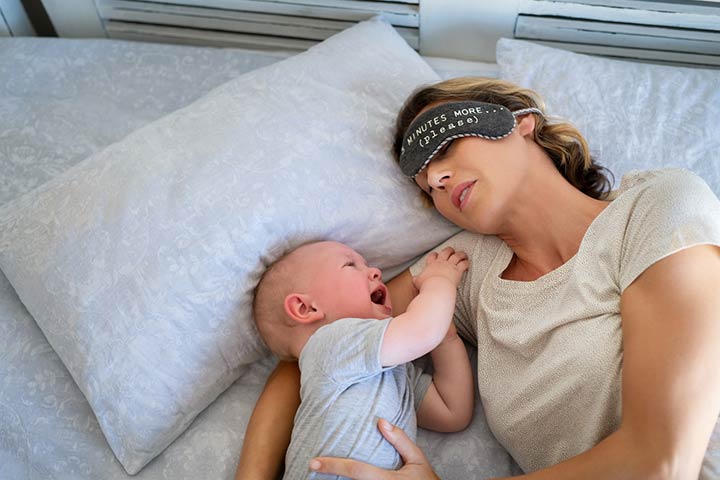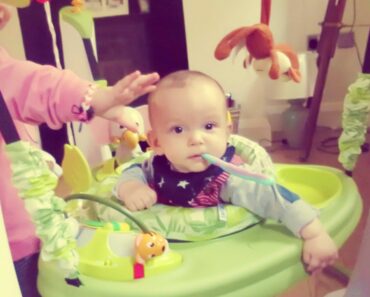Image: iStock
Sleep regression is the period when your formerly sleeping baby has trouble falling asleep at the usual bedtime or suddenly wakes up fussing in the middle of the night. This may often last for two to six weeks in most babies.
Sleep regression in babies is a part of their normal growth and development. Parents or caregivers can use appropriate strategies to help the baby sleep again. Do not hesitate to seek medical care if your baby has signs of illnesses along with sleep regression.
Read this post to know about the causes, duration, onset, and tips to manage sleep regression in babies.
Causes Of Sleep Regression In Babies
Any factors causing discomfort, anxiousness, and restlessness can lead to sleep regression. The common causes of sleep regression in babies may include the following(1).
- Growth spurts due to increased hunger
- Achieving a new developmental milestone may make them excited
- Teething pain
- Changes in routines such as new daycare
- Sleep in new environments such as while traveling
- Health issues such as ear infection and common cold
Seek a pediatrician’s advice if your baby has sleep regression due to any illness. If there are no concerning problems, you may soothe them to sleep.
When Does Sleep Regression Occur?
Timings of all cases of sleep regression are not predictable since it can also be due to unpredictable factors such as sickness and disruption in daily routines. However, it is possible to predict when a baby will experience sleep regression due to teething, growth spurts, or new milestones since they occur at a certain age.
Babies may have sleep regression at the following ages(2)(3)(4).
- 3 to 4 months: Most babies may have their first sleep regression in the third or fourth month of their life. 3-month or 4-month sleep regression is often tiring for many parents and caregivers since it is the first one. Increased hunger due to growth spurts and emotional development are common culprits of the baby’s first sleep regression.
- 6 months: Growth spurt causes the 6-month sleep regression in babies. At this age, most babies can sleep through the night. However, some babies experiencing sleep regression may wake up at night for cuddles and comfort.
- 8 to 10 months: New milestones can be the reason for sleep disturbances from 8-10 months. Most babies begin to crawl around nine months and stand around ten months. Some may achieve these milestones a little sooner or later than others. Separation anxiety is also a normal and common reason for waking up from sleep at this age. Babies with separation anxiety may wake up and look around to ensure that the parents or caregiver is with them.
- 12 months: Reaching new milestones of standing and walking a few steps can lead to sleep problems at 12months in some babies. Although many may start walking at an average age of 14 months, some may begin earlier.
- 15 months: Babies who begin walking at this age could have sleep regression. Transition to fewer naps can also be a reason for sudden sleep disturbances. The sleep problems at this stage may extend for three to six weeks.
- 18 months: Sleep regression in an 18-month-old can be due to several achievements, including walking and talking abilities. Toddlers can also throw tantrums at night time if you try to put them to sleep. Separation anxiety and teething can also cause sleep issues around 18 months of age.
- 24 to 36 months: Sleep regression in a two-year-old can be due to various reasons. This is when they undergo major training such as potty training, change of bedding, or getting a new sibling, and these factors may disrupt the little one’s sleep. Fear of darkness, nightmares, night terrors, and growth spurts can also affect the sleep of some toddlers.
Although age-related factors may cause sleep problems, never forget to look for signs of health problems since it may also lead to sleep regression.
How Long Does Sleep Regression Last?
The exact duration of sleep regression depends on the cause, and it may vary in each baby. Sleep regression due to new routines and milestones may usually last for two to six weeks(5).
Disturbed sleep due to illnesses may last longer or may not resolve until the underlying cause is treated. A healthy baby withan unchanged routine and sleep training may have shorter sleep regressions than others.
Signs Of Sleep Regression In Babies
Sleep regression signs may vary in each infant depending on the underlying cause. The following signs are usually seen in babies during sleep problems.
- Shows more crankiness or fussiness
- Unable to fall asleep at the regular bedtime
- Waking up frequently at night
- Crying or making sounds at sleep time
You may also look for signs of underlying causes such as increased hunger due to growth spurts, runny nose, fever, stuffy nose, and tugging or pulling ear due to colds or ear infections.
Tips For Managing Sleep Regression In Babies
The following tips may help you manage your baby’s sleep regressions(6)(7).
- Know sleep cues: Look for sleep cues such as yawning, rubbing eyes, and looking away. Lay the baby in the crib immediately since it could help them fall asleep without trouble.
- Feed more: If your baby appears more hungry than usual, do not hesitate to offer extra feedings. This may help them cope with the additional calorie loss due to growth spurts.
- Stick to a bedtime routine: Maintain a regular bedtime routine for your baby. Bathing, reading books, and listening to lullabies could be the activities that precede nighttime sleep. A fixed routine could make the baby feel sleepy at the same time each night.
- Comfort them: Comforting the baby may help them soothe themselves to sleep. You may pat them on the head or tummy and say reassuring words in a soft voice. Avoid cuddling, feeding, and rocking your baby since this may make them wake up and cry regularly for attention.
- Let them self-soothe: If your baby cries suddenly in the night, wait for a few minutes to let them fuss and self-soothe. Many babies soothe themselves and continue to sleep without parents’ interventions.
- Sleep training: Sleep training can be beneficial to manage sleep problems in babies older than six months. You may try at least for two weeks to know if it is useful or not.
- Manage separation anxiety: Separation anxiety can be managed by giving extra care during the day or before bedtime. Ensuring that you are there for them may let them fall asleep without fear of being apart.
- Regulate daytime naps: Ensure that your baby is getting enough daytime sleep according to their age. Some babies may have sleep issues if daytime naps are disturbed.
Factors That Worsen Sleep Regression
Anxiety, anger, and yelling from parents or caregivers may worsen sleep disturbances in babies. This can make bedtime routines more stressful. You may try strategies to calm yourself at your baby’s bedtime.
If you are overtired with sleepless nights, it is normal for you to be more impatient and stressed. Sharing the work among parents or caregivers can reduce the strain. Taking turns may help the other person to have a sound sleep on alternate nights.
Can You Prevent Sleep Regression?
There is no way to prevent sleep regression in babies. It is a normal part of their development. A regular sleep schedule and other tips could help you reduce the duration and severity of the baby’s sleep regression. Sleep regression due to illnesses could be avoided through timely treatment.
When To Call A Doctor
You may seek personalized sleep recommendations from your baby’s pediatrician or a pediatric sleep consultant to tackle any specific problems. It is recommended to seek medical help if you are unsure of the causes of sleep problems in your baby.
Seek pediatric consultation if your baby has signs of illnesses, such as pulling ears, fever, or night terrors. It is also advisable to visit a pediatrician if the sleep regression persists beyond six weeks.
Sleep regression in babies could cause discomfort and inconvenience to parents. Thankfully, the phase is temporary. Appropriate management and sharing of responsibilities among parents could make it easier to tackle the regression. Talking to other parents and experts may also help you to tackle your baby’s sleep problems.


































